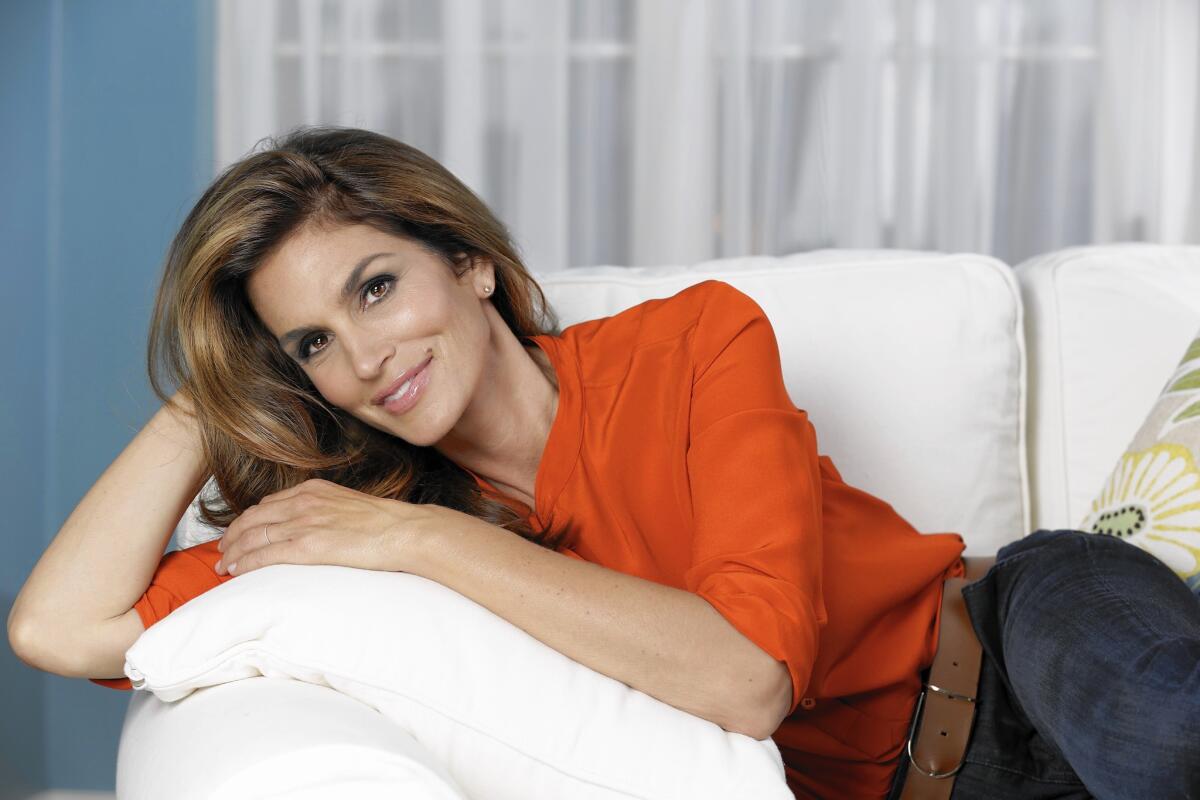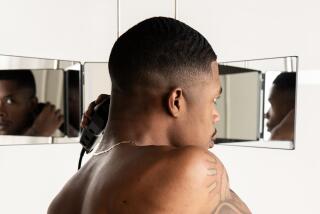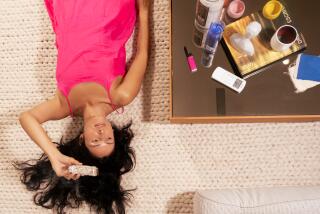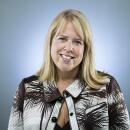Cindy Crawford talks ‘Becoming’ herself, being a mom and learning to love her mole

Cindy Crawford is one of the iconic American beauties of the 20th century. The famous mole at the corner of her mouth had teenagers (myself included) drawing on beauty marks with eyeliner. Her curves brought a more athletic body type into vogue. And her role hosting the MTV series “House of Style” helped move fashion into the realm of pop culture.
As a supermodel in the 1980s and ‘90s, she smiled back from thousands of magazine covers, worked with the world’s most famous photographers (Helmut Newton, Richard Avedon, Irving Penn and Herb Ritts), starred in a Pepsi Super Bowl commercial and had a part in George Michael’s “Freedom” video. Prince named a song after her, she was on the cover of Playboy twice, and she collaborated with some of the biggest labels in the business, including Versace and Chanel, paving the way for the model-as-brand phenomenon by launching workout videos, a furniture collection (Cindy Crawford Home) and skin care line (Meaningful Beauty). And she did it all while managing to stay out of trouble, and maintaining a down-to-earth persona true to her Midwestern roots in DeKalb, Ill.
Today, Crawford is more Malibu mom than mega model (though she did pop up in Taylor Swift’s “Bad Blood” music video), more comfortable wearing a SoCal uniform of jeans, blouse, high heels and very little makeup than haute couture. She’s been married to nightlife entrepreneur (and former model) Rande Gerber for 17 years, and the couple have two look-alike children who are following in their fashion footsteps. Kaia, 13, and Presley, 15, recently signed with top agency IMG, and appeared in photo spreads in Vogue and CR Fashion Book.
On Feb. 20, Crawford is to turn 50, and she’s celebrating early by releasing a new book, “Becoming” (Rizzoli, Sept. 29). The book is filled with plenty of gorgeous glossy photos, of course, but it’s not just a vanity project. It also has insights into how she came to love her mole, learned to work a lens, posing nude and more.
Among the take-aways? Crawford did pick corn in the fields during the summers, but that’s not how she was discovered, despite legends to the contrary. (Instead, she was found by a local newspaper photographer, whose shot of her attracted positive comments.) That even a future supermodel can be bullied: Once when she thought she had her first modeling gig, at a local department store, it turned out to be mean girls from her high school playing a prank. She went to Northwestern to study chemical engineering but left after her first semester to pursue her career. And she’s always approached modeling as a job. “It’s what I do, not who I am,” she writes.
I sat down with Crawford in L.A. recently to talk about the book, how she feels about aging, her kids getting into the business and more. Here are some of Crawford’s takes.
On insecurity (yes, even supermodels have it):
We’re a culture that makes snap judgments based on how people present themselves. Being a model, not all of it’s positive. When I left school to take modeling more seriously and realized people assumed I was stupid because I was a model, that was hard. But somewhere along the line, I realized it was more about them than me. I got past that, and didn’t feel I needed to tote around a Dostoevsky book just to prove I was smart.
On finding self-confidence:
By my age, hopefully you have that inner self-confidence, hopefully, because that’s what we’re all working toward, that’s the becoming part. But I’m the mother of a 13-year-old-daughter who is beautiful and who says, “I hate my eyebrows, I hate my hair.” But I was that age too, and I hated my eyebrows and my hair and my mole. The mole was the thing I got teased about and was embarrassed about, and that set me apart. You have to embrace where you’re different. My daughter, Kaia, didn’t get the mole but my son, Presley, did and he wanted to get it removed. I took him to a doctor who said exactly what my mom said to me: “You’ll have a scar.” But it was good because he made the decision himself not to have it removed.
On the beauty ideal:
I love the fact that I had a beauty mark and that I became a symbol of beauty that helped other women embrace their differences. And that I had brown eyes, not blond hair and blue eyes. The generation before me, Kelly Emberg and Christie Brinkley, were that blond, tan, Sports Illustrated girl look. My generation, Christy Turlington, Linda Evangelista, Naomi Campbell, we all looked different. We helped broaden the idea of beauty.
On high fashion:
I got the pleasure of wearing it, so I didn’t covet it. I like nice things and Azzedine Alaïa used to pay us in clothes, so I’ll pull out a great Alaïa leather jacket, and Kaia can’t wait to grow into it. But I wasn’t a collector or consumer in that way. Some women, the one time in their life they get their makeup done is their wedding. But my wedding I wanted no makeup because I got to play dress up every day.
On raising kids:
I’m still figuring it out. But I do know that kids watch you. So if I’m kind to myself, and not going, “Oh my God, I hate my … fill in the blank.” Even though I still have insecurities, I want to be a good example even if I’m faking it sometimes.
On her children modeling:
When they were kids, they just had a normal life. But the thing is, you have paparazzi and it’s a little weird when your 3-year-old is asking why that guy is taking pictures of us. I never really came up with a good answer. But I feel like every girl is a model in her own life anyway now because of Instagram. So even if I said no modeling, Kaia would be modeling because she’s posing for her friends for Instagram. I’m not, like, “move to New York, you’re full in it.” But if she gets the opportunity to do a shoot with a Bruce Weber or Steven Meisel, those are going to be her legends, like I wrote about Avedon and Penn.
On posing nude again:
I did a shoot with photographers Mert [Alas] and Marcus [Piggott] for W magazine last year where I was almost nude but not totally nude. The problem now is my husband and my son. Even if my daughter posts something on Instagram, and I think she’s appropriate, my son will say, “Did you see what Kaia posted?” I’ll tell him I think it’s fine. And he says, “But you posed in Playboy!” So it’s like I don’t get a say. For me personally it might be something, but to consider the whole family, the picture doesn’t add up.
On celebrating the big 5-0:
I’m happy, I love my life, I don’t like birthdays. Everyone’s like what are you doing for your 50th? I wrote a book. My husband always wants to plan things for my birthday, and we always end up canceling and having dinner at home with the kids, and I’ll do baked potato and caviar. But I don’t know. The buildup is worse than the reality. That’s what I found at 40. Now it’s finally happening and then it will be over and I will be 50. I will feel the same, I feel great. But it’s daunting. It’s a big number, especially for women. You can’t pretend you’re a girl anymore. You might feel girlie inside but you hopefully are kinda like, this is who I am with my flaws.
On the future:
I feel like my life as a model, it’s not that I’m letting it go, because when I’m doing a shoot for my furniture line, I’m getting my picture taken and that’s modeling. But it’s different. The next chapter is the businesses I’m working on.... And I also like championing other people. The beginning of my career, it was like, you’re a model, they say “put this on” and you do it. Then I got to develop my own businesses and projects, and now I like partnering with or being involved with projects that are less ego-centric but still interesting, or that I can add something to because you do learn a lot over the years. Also, my kids will be gone before I know it, so over the next five years I want to focus on helping them.







